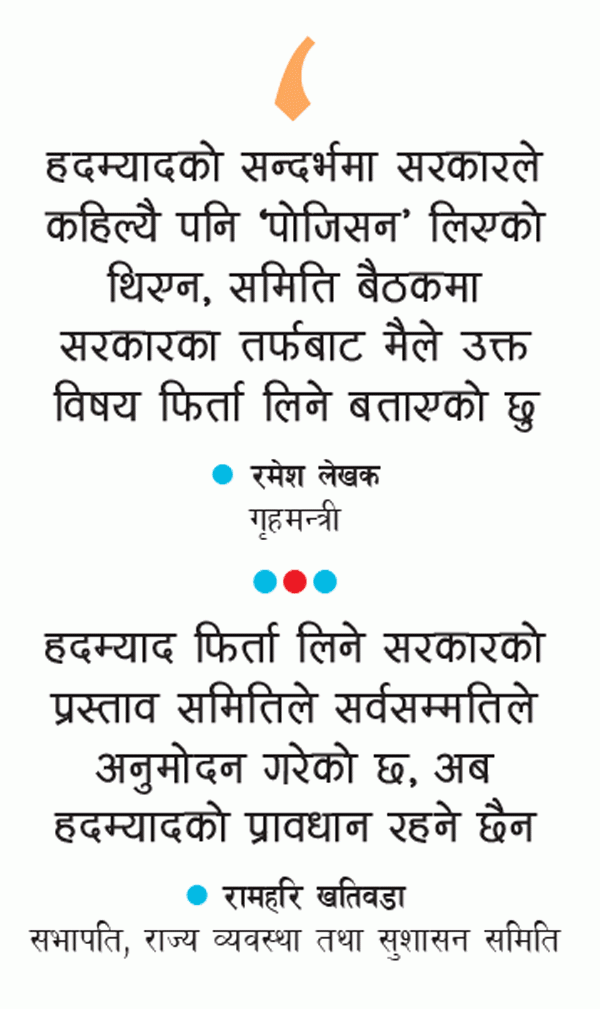The government will withdraw the limit in the corruption case

We use Google Cloud Translation Services. Google requires we provide the following disclaimer relating to use of this service:
This service may contain translations powered by Google. Google disclaims all warranties related to the translations, expressed or implied, including any warranties of accuracy, reliability, and any implied warranties of merchantability, fitness for a particular purpose, and noninfringement.

Highlights
- Whether or not to bring the private sector under the jurisdiction of the authority, whether to accept anonymous complaints, whether or not public office holders should be suspended after a corruption case is registered, and where to address the issue of political corruption are yet to be finalized.



After all-round criticism, the government is going to withdraw the provision of '5-year limitation' in the case of corruption. On Friday, Home Minister Ramesh Akhtar told the Parliament's State Order and Good Governance Committee that the government is ready to withdraw the provision of 'Hadmyad'. The committee will no longer include any provision regarding the limitation period in the bill.

The bill to amend the Prevention of Corruption Act 2059 under consideration in the State Order and Good Governance Committee became controversial due to the provision of 'Hadmyad'. Section 45(1) of the bill says - "In cases of corruption, a case must be prosecuted within five years from the date of knowing that such an act has been committed." There was opposition from the streets to the parliament saying that this provision would protect the corrupt.
On Friday, the committee called the home minister writer for discussion on the same point. All the members present in the committee said that the point should be removed. In the meeting, Home Minister Akbar said that the government has never taken a 'position' regarding the issue of 'Hadmyad' and is ready to withdraw it. The government had never taken a position regarding the limit. It seems that there has been a lot of discussion on this topic. In the committee meeting, on behalf of the government, I said that I will withdraw the matter," he said.
Chairman of the committee, Ramhari Khatiwada, said that while the committee was unanimous in removing the provision related to ``Hadmyad'' in the corruption case, the government was also ready to withdraw it. The committee has unanimously approved the government's proposal to withdraw the term. Now there will be no limitation provision in the bill. The committee will finalize the bill so that there is no hindrance in the prosecution of the corruption offense at any time," he said.
committee member Maoist chief whip Hitraj Pandey said that he opposed the provision of the 5-year limitation in the bill as it was abstract and there was suspicion that action would be taken. "When there was a government of two big parties, there was a suspicion that the government would do whatever it wanted," he said.

The bill was registered in the National Assembly in January 2076 by the then CPN government. At that time, KP Sharma Oli was the Prime Minister and Ram Bahadur Thapa was the Home Minister. After two years, the National Assembly passed the bill in March 2079 and sent it to the House of Representatives. The Prevention of Corruption Act, 2059 does not have a statute of limitation in the original law.
In Article 45 of the Basic Law, "When a national servant is holding a position, in relation to embezzlement or loss/damage of government or public property or the property of an institution owned by the Government of Nepal, after such person retires from his position, there is no provision in this Act to prosecute him. shall not be deemed to interfere.' Sub-sections have been added to section 45 in the amendment bill. In sub-section (1) the subject of 'five-year limitation' is kept.
Committee chairman Khatiwada said that although one issue of the proposed bill has been decided, other issues are still under discussion. The issue of whether to give the authority to investigate corruption in the private sector to the Commission for Investigation of Abuse of Authority is also in dispute. Similarly, whether to accept/not accept anonymous complaints, whether or not public office holders should be suspended after registration of corruption cases, and where to address the issue of political corruption will have to be decided by the committee.
 प्रकाशित : भाद्र १५, २०८१ ०५:०८
प्रकाशित : भाद्र १५, २०८१ ०५:०८

 २९.१२°C काठमाडौं
२९.१२°C काठमाडौं











